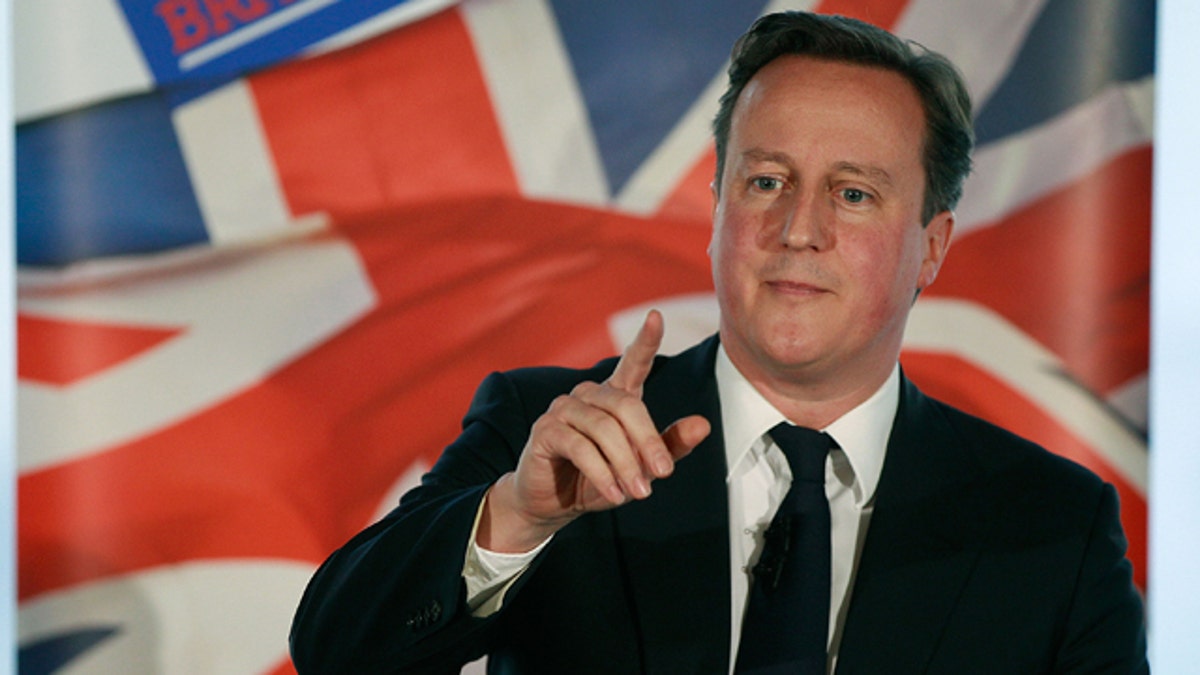
Jan. 19, 2012- Britain's Prime Minister, David Cameron, makes a speech on responsible capitalism at New Zealand House in London, England. The Prime Minister urged Scotland on Thursday, February 16 to refrain from applying for independence from the UK. (AP)
LONDON-- Britain can no longer ignore that its influence on the world is shrinking amid the rise of developing nations, a panel of senior lawmakers said Thursday in a sharply critical report.
The group also said Britain should prepare for looser ties with the United States as the U.S. shifts its focus from western Europe.
Parliament's Joint Committee on National Security Strategy, which includes an ex-head of the domestic MI5 spy agency, Eliza Manningham-Buller, rebuked Prime Minister David Cameron's government over its failure to accept that the nation's power is in decline as austerity measures trim the nation's military and dent diplomatic ranks.
Britain's national security strategy, published in October 2010, insisted that the U.K. would maintain its position as a major world power, despite budget constraints and the shift of economic might from the West to the developing world.
"This is wholly unrealistic in the medium to long term and the U.K. needs to plan for a changing, and more partnership dependent, role in the world," the committee said it its report.
Cameron is making spending cuts worth about 103 billion pounds ($162 billion) through 2017 aimed at slashing Britain's budget deficit, including an 8 percent reduction to its annual 37 billion pound ($58.8 billion) defense budget over four years.
The panel of House of Commons and House of Lords members also urged Cameron to "reflect deeply on the long term implications" of the U.S. turning its attention away from Europe.
President Barack Obama has announced plans to shift the U.S. military's focus back to the Asia-Pacific region following the winding down of operations in Iraq and Afghanistan.
Cameron will hold talks with Obama in Washington next week on the planned drawdown of troops from Afghanistan and the end of the international mission there in 2014.
"If the U.S. is moving its focus eastwards, there is the possibility it will become involved in conflicts in which the U.K. has little direct interest," the report said. "Conversely, the U.S. may be less interested in situations involving U.K. interests."
Committee Chairman Margaret Beckett, a former foreign secretary, said Britain must decide what "sort of country we want the U.K. to be in future and whether our ambitions are realistic."
She criticized the government's latest strategy as flawed. "A good strategy is realistic, is clear on the big questions, and guides choices. This one does not," Beckett said.
The panel also criticized Britain's national security council for failing to consider in detail the possible risks to the U.K. which would be posed by a full -- or partial -- collapse of the eurozone.
"It also needs to examine the long term strategic impact for the U.K. of any measures to save the euro, such as further eurozone political integration or the exit of some states from EU membership," the panel said.
Britain's government has insisted it has carried out contingency planning, and held discussions with businesses, over a possible eurozone collapse.
